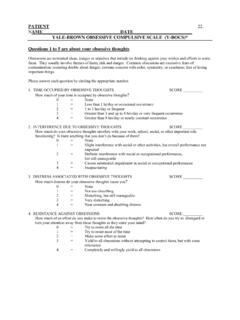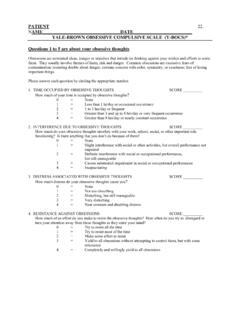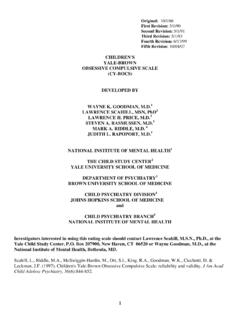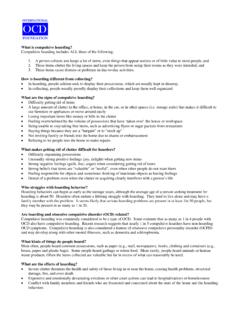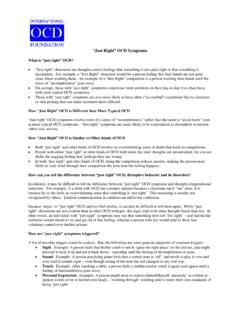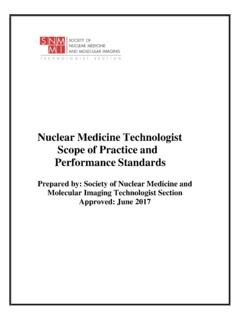Transcription of International OCD Foundation
1 International OCD Foundation W h at Y o u N e e d t o K n o w a b o u t Obsessive Compulsive Disorder What Is Obsessive Compulsive Disorder (OCD)? Imagine that your mind got stuck on a certain thought or image .. Then this thought or image got replayed in your mind over and over again no matter what you did .. You don't want these thoughts - it feels like an avalanche .. Along with the thoughts come intense feelings of anxiety .. Anxiety is your brain's warning system. When you feel anxious it feels like you are in danger. Anxiety is an emotion that tells you to respond, react, protect yourself, DO SOMETHING .. On the one hand, you might recognize that the fear doesn't make sense, doesn't seem reasonable yet it still feels very real, intense, and true.
2 Why would your brain lie? Why would you be experiencing feelings if they weren't true? Feelings don't lie .. Unfortunately, if you have OCD, they do lie. If you have OCD, the warning system in your brain is not working correctly. Your brain is telling you that you are in danger when you are not. When scientists compare pictures of the brains of groups of people with OCD, they can see that on average some areas of the brain are different compared to individuals who don't have OCD. Those tortured with this disorder are desperately trying to get away from paralyzing, unending anxiety. 2. How Will I Know if I Have OCD? Only trained therapists can diagnose OCD.
3 They will look for three things: The person has obsessions. He or she does compulsive behaviors. The obsessions and compulsions take a lot of time and get in the way of important activities the person values (working, going to school, etc.). Obsessions: Thoughts, images, or impulses that occur over and over again and feel out of the person's control. The person does not want to have these ideas. He or she finds them disturbing and unwanted, and usually knows that they don't make sense. They come with uncomfortable feelings, such as fear, disgust, doubt, or a feeling that things have to be done in a way that is "just right.". They take a lot of time and get in the way of important activities the person values (socializing, working, going to school, etc.)
4 What Obsessions are not . It is normal to have occasional thoughts about getting sick or about the safety of loved ones. Compulsions: Repetitive behaviors or thoughts that a person engages in to neutralize, counteract, or make their obsessions go away. People with OCD realize this is only a temporary solution, but without a better way to cope they rely on the compulsion as a temporary escape. Can also include avoiding situations that trigger their obsessions. Time consuming and get in the way of important activities the person values (socializing, working, going to school, etc.). What Compulsions are not . Not all repetitive behaviors or rituals are compulsions.
5 Bedtime routines, religious practices, and learning a new skill involve repeating an activity over and over again, but are a welcome part of daily life. Behaviors depend on the context: Arranging and ordering DVDs for eight hours a day isn't a compulsion if the person works in a video store. 3. Common Obsessions in OCD*. Contamination Harm Body fluids Fear of being responsible for (examples: urine, feces) something terrible happening Germs/disease (examples: fire, burglary). (examples: herpes, HIV) Fear of harming others because Environmental contaminants of not being careful enough (examples: asbestos, radiation) (example: dropping something on the ground that someone Household chemicals might slip on and hurt (examples: cleaners, solvents) themselves).
6 Dirt Unwanted Sexual Thoughts Losing Control Forbidden or perverse sexual Fear of acting on an impulse thoughts or images to harm oneself Forbidden or perverse sexual Fear of acting on an impulse impulses about others to harm others Obsessions about Fear of violent or horrific images homosexuality in one's mind Sexual obsessions that involve Fear of yelling out insults or children or incest swearing Obsessions about aggressive Fear of stealing things sexual behavior towards others Perfectionism Religious Obsessions Concern about evenness (also called Scrupulosity). or exactness Concern with offending God Concern with a need to know or blasphemy.
7 Or remember Excessive concern with Fear of losing or forgetting right/wrong or morality. important information when Other Obsessions throwing out something Concern with getting a physical Unable to decide whether to illness or disease (not by keep or to discard things contamination , cancer). Fear of losing things Superstitious ideas about lucky/. unlucky numbers, certain colors * Reprinted with permission by New Harbinger Publications, Inc. This is an adaptation of the OC. Checklist which appears in S. Wilhelm and G. S. Steketee's, Cognitive Therapy for Obsessive- Compulsive Disorder: A Guide for Professionals (2006). 4. Common Compulsions in OCD*.
8 Washing and Cleaning Mental Compulsions Washing your hands too much Mental review of events or in a certain way to prevent harm Excessive showering, bathing, (to oneself, others, to prevent tooth brushing, grooming or terrible consequences). toilet routines Praying to prevent harm Cleaning household items or (to oneself, others, to prevent other objects too much terrible consequences). Doing other things to prevent Counting while performing a or remove contact with task to end on a good , right , contaminants or safe number Cancelling Out or Undoing . Checking (example: replacing a bad . Checking that you did not/will word with a good word to not harm others cancel it out).
9 Checking that you did not/will Other Compulsions not harm yourself Collecting items which results Checking that nothing terrible in significant clutter in the home happened (also called hoarding). Checking that you did not make Putting things in order a mistake or arranging things until it Checking some parts of your "feels right". physical condition or body Telling, asking, or confessing Repeating to get reassurance Rereading or rewriting Avoiding situations that might trigger your obsessions Repeating routine activities (examples: going in or out doors, getting up or down from chairs). Repeating body movements (example: tapping, touching, blinking).
10 Repeating activities in multiples . (examples: doing a task three times because three is a good , right , safe number). * Reprinted with permission by New Harbinger Publications, Inc. This is an adaptation of the OC. Checklist which appears in S. Wilhelm and G. S. Steketee's, Cognitive Therapy for Obsessive- Compulsive Disorder: A Guide for Professionals (2006). 5. OCD: John Greist Clinical Professor of Psychiatry, University of Frequently Wisconsin; International OCD Foundation Asked Scientific Advisory Board Questions Maggie Baudhuin, MLS. Coordinator, Madison Institute of Medicine, Inc. How common is OCD? Our best estimates are that about 1 in 100 adults or between 2 to 3.

